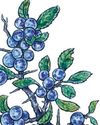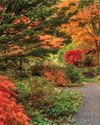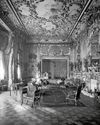
THE older farmhouses scattered across rural, deeply wooded areas on the Surrey and Sussex border have lost nothing of their appeal in the 21st century. Willards Farm, near Dunsfold, has recently been subject to sympathetic renovation and substantial extension. At its core, the house is a four-bay, 16thcentury timber-framed house of two storeys, under a clay-tile roof, with a substantial off-center chimney stack. It occupies an elevated site and was extended to its northern end in the 1930s and to the south in the 1980s. The latest works, completed in 2019, were imaginatively designed by architect Stuart Martin for a young family.
These new additions celebrate the famous domestic vernacular tradition of this district in two different ways. Firstly, the timber-frame original has been sensitively renovated and enhanced; secondly, new reception rooms and accommodation have been created to the north and west, representing an artistic response to the traditional vernacular of timber, brick, and clay tile, and modelled forms. At the clients' request, local people were used wherever possible in the construction work; the principal contractors, Brickfield Construction, are from nearby Fernhurst and many of the craftspeople employed on the interiors come from the area.
Mr. Martin studied architecture at the University of Nottingham and first worked for conservation specialist Jeremy Benson (1925–99) of Benson and Bryant, a leading figure in the Society for the Protection of Ancient Buildings (SPAB). Mr. Martin founded his award-winning practice, based near Evershot in Dorset, in 1996, and has made a name for himself creating well-designed houses in both the Classical and vernacular traditions. Chitcombe House, Dorset, a country house designed by him (COUNTRY LIFE, September 6, 2017), exemplifies an imaginative response to both the Classical tradition and the courtyard form.
Denne historien er fra April 20, 2022-utgaven av Country Life UK.
Start din 7-dagers gratis prøveperiode på Magzter GOLD for å få tilgang til tusenvis av utvalgte premiumhistorier og 9000+ magasiner og aviser.
Allerede abonnent ? Logg på
Denne historien er fra April 20, 2022-utgaven av Country Life UK.
Start din 7-dagers gratis prøveperiode på Magzter GOLD for å få tilgang til tusenvis av utvalgte premiumhistorier og 9000+ magasiner og aviser.
Allerede abonnent? Logg på

Kitchen garden cook - Apples
'Sweet and crisp, apples are the epitome of autumn flavour'

The original Mr Rochester
Three classic houses in North Yorkshire have come to the market; the owner of one inspired Charlotte Brontë to write Jane Eyre

Get it write
Desks, once akin to instruments of torture for scribes, have become cherished repositories of memories and secrets. Matthew Dennison charts their evolution

'Sloes hath ben my food'
A possible paint for the Picts and a definite culprit in tea fraud, the cheek-suckingly sour sloe's spiritual home is indisputably in gin, says John Wright

Souvenirs of greatness
FOR many years, some large boxes have been stored and forgotten in the dark recesses of the garage. Unpacked last week, the contents turned out to be pots: some, perhaps, nearing a century old—dense terracotta, of interesting provenance.

Plants for plants' sake
The garden at Hergest Croft, Herefordshire The home of Edward Banks The Banks family is synonymous with an extraordinary collection of trees and shrubs, many of which are presents from distinguished friends, garnered over two centuries. Be prepared to be amazed, says Charles Quest-Ritson

Capturing the castle
Seventy years after Christian Dior’s last fashion show in Scotland, the brand returned under creative director Maria Grazia Chiuri for a celebratory event honouring local craftsmanship, the beauty of the land and the Auld Alliance, explains Kim Parker

Nature's own cathedral
Our tallest native tree 'most lovely of all', the stately beech creates a shaded environment that few plants can survive. John Lewis-Stempel ventures into the enchanted woods

All that money could buy
A new book explores the lost riches of London's grand houses. Its author, Steven Brindle, looks at the residences of plutocrats built by the nouveaux riches of the late-Victorian and Edwardian ages

In with the old
Diamonds are meant to sparkle in candlelight, but many now gather dust in jewellery boxes. To wear them today, we may need to reimagine them, as Hetty Lintell discovers with her grandmother's jewellery